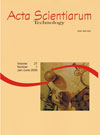<b>Study of catalysts based on copper and niobium oxide in steam reforming of ethanol</b> - DOI: 10.4025/actascitechnol.v29i1.78
DOI:
https://doi.org/10.4025/actascitechnol.v29i1.78Keywords:
reforma de etanol com vapor d´água, produção de hidrogênio, catalisadores Cu/Nb<sub>2</sub>O<sub>5</sub>Abstract
Cu/Nb2O5 catalysts were modified by the incorporation of MgO or K2O (support acidity reducer) and Ni (a facilitator of the bond break C-C) to be used in the ethanol reforming in bench-scale unit with catalytic bed of 7 g at 573 K, varying the space velocity and the molar rate of the reagents in order to optimize the process of production of hydrogen with consequent decrease of by-products. The catalysts were characterized by specific superficial area, X-ray diffraction and temperature programmed reduction. Results showed that the introduction of the basic oxide or a second metal, nickel, lead to an increase in the porosity and in the temperature at the beginning of copper reduction in the catalyst. The acidity reduction of the support decreased the formation of by-products and increased the hydrogen formation. Nickel as a second metal increased the production of CO and CH4.Downloads
Download data is not yet available.
Downloads
Published
2007-12-18
How to Cite
Rizzo-Domingues, R. C. P., Cantão, M. P., & Fernandes, N. R. C. (2007). <b>Study of catalysts based on copper and niobium oxide in steam reforming of ethanol</b> - DOI: 10.4025/actascitechnol.v29i1.78. Acta Scientiarum. Technology, 29(1), 1–7. https://doi.org/10.4025/actascitechnol.v29i1.78
Issue
Section
Chemical Engineering
License
DECLARATION OF ORIGINALITY AND COPYRIGHTS
I Declare that current article is original and has not been submitted for publication, in part or in whole, to any other national or international journal.
The copyrights belong exclusively to the authors. Published content is licensed under Creative Commons Attribution 4.0 (CC BY 4.0) guidelines, which allows sharing (copy and distribution of the material in any medium or format) and adaptation (remix, transform, and build upon the material) for any purpose, even commercially, under the terms of attribution.
Read this link for further information on how to use CC BY 4.0 properly.
0.8
2019CiteScore
36th percentile
Powered by 



0.8
2019CiteScore
36th percentile
Powered by 

















8.png)




